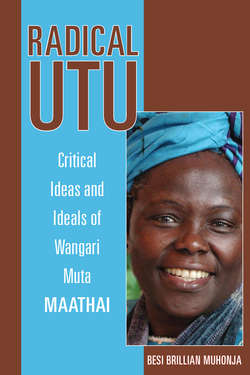Radical Utu

Реклама. ООО «ЛитРес», ИНН: 7719571260.
Оглавление
Besi Brillian Muhonja. Radical Utu
Отрывок из книги
Radical Utu
This series of publications on Africa, Latin America, Southeast Asia, and Global and Comparative Studies is designed to present significant research, translation, and opinion to area specialists and to a wide community of persons interested in world affairs. The series is distributed worldwide. For more information, consult the Ohio University Press website, ohioswallow.com.
.....
Meanwhile, events in the Kenyan political sphere further stimulated the development of her public persona. While her marriage was deteriorating, on August, 22, 1978, Jomo Kenyatta passed away and was succeeded by Daniel arap Moi. This ushered in a period of adverse interactions between Maathai and Moi as his presidency produced conditions that required more radical responses from activists. Her personal contestations with him started with her interest in the position of chair of the NCWK at the annual elections in 1979. She ran for the post that year but lost by three votes and served for a year as vice chair.
The following year, when she ran for chair again, the government, not wanting her to serve, interfered openly with the elections through representatives of the NCWK’s largest member organization, the MYWO. The government representatives expected the MYWO to take charge by making the case that the NCWK was an organization for elite women that was disconnected from grassroots women and who could not understand their needs or represent their interests. Even with this interference, Maathai won the election (Maathai 2007a, 157–58), and she would be reelected year after year until 1987, when she did not run for office. Her initial win caused the government to pull support for the NCWK, forcing members to find other ways to fund their operations and initiatives. Further, the MYWO withdrew from the NCWK, and the government directed most support toward women’s initiatives through the former. Despite these roadblocks and immense financial problems, the NCWK gained local and global visibility for its work on the environment, development, and women’s empowerment under Maathai’s leadership.
.....